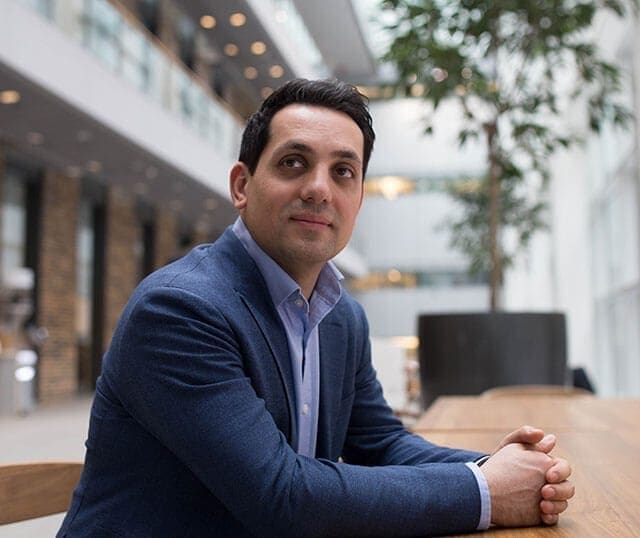#HumansofMaRS: Pathcore’s ‘digital cockpit’ helps pathologists diagnose cancer
By Charlotte Evans | February 15, 2017

Enhancing cancer care from the beginning of a patient’s journey is critical to saving more lives.
Dan Hosseinzadeh wants to do just that, by bringing pathologists into the digital age. He’s using technology to help them diagnose cancer faster and with greater accuracy. Just as radiology made the transition to digital over 20 years ago, pathology is now making the same shift.
Today, if you suspect you have cancer, the path to diagnosis and treatment can be long, especially if you live in a remote community.
Firstly, you see your family doctor, who – if they suspect something is going on – will send you to radiology for imaging. This might mean an X-ray or an MRI scan. Depending on what the radiologist finds, he or she will then send you for a biopsy to sample the tissues and cells of the suspicious region. Lastly, and most critically, a pathologist analyzes the results of the biopsy to form a diagnosis, the accuracy of which will determine if you have cancer, the course of treatment and, ultimately, the odds of survival.
This is where Dan Hosseinzadeh, founder and CEO of Pathcore, wants to help. Fresh from winning first place at the Redefining Early Stage Investments (RESI) Innovation Challenge in San Francisco in January, Dan explains the inspiration behind Pathcore.
Optimizing through automation
Pathcore was born out of Dan’s natural ability and desire to optimize inefficient processes.
“I’m an engineer, so I find optimal and efficient ways to automate things. When I find something that doesn’t work well, I try to make it better through automation.”
Before starting his business, Dan worked as a research engineer at Sunnybrook Research Institute, where he learned that pathologists work in a very analog fashion, using microscopes and glass slides to analyze the tissues. This analog workflow is inefficient, limits collaboration and training opportunities, is prone to errors, and of course is labourious and manual. As a result, Dan saw an opportunity to improve the pathologist’s workflow through the incorporation of digital tools and computation.
“Pathologists are the eyes and ears of medicine. It’s very complex work and their findings are the basis of all treatments. If the pathologist gets it wrong, you can get the wrong treatment. Therefore, consistency and accuracy of pathological interpretation is of utmost importance.”
Cancer is particularly complicated, because a lot of time is spent analyzing and characterizing thousands of cells and tissues. Dan wanted to develop technology that would simplify this process and launched Pathcore commercially in August 2016.
Advanced digital pathology software
Pathcore’s advanced digital pathology software is now being adopted across a number of sites. The company’s initial target was the United States, since it has the biggest healthcare market in the world and he found the procurement process fairly easy to navigate. However, Dan is now turning his attention to other markets – including Canada.
He describes the product as, “…a digital cockpit that allows pathologists to access and manage imaging and clinical data within one system from anywhere in the world. Additionally, the software provides algorithms that help experts optimize and expedite the way they work on and diagnose tissue.”
He says one of the biggest advantages of the tool is that it enables faster collaboration across multiple locations. For example, in remote communities physicians can digitally scan tissue from a biopsy and send it to a pathologist in a large, urban hospital for immediate diagnosis and/or consultation. Patients don’t have to wait around for results; they can be told whether or not they have cancer before they even leave the hospital.
“In terms of time and cost savings, this technology could have a great impact on the healthcare system. Inefficient processes are eliminated and workflows are streamlined. We take shipping and faxing out of the equation. Also, through the use of algorithms, accuracy of diagnosis can be improved ultimately providing a better experience for the patients,” Dan explains.
Two important functions are improved – intraoperative consultations (IOC) and rapid onsite assessments. The former allows for a second opinion from a pathologist during surgery, while the latter ensures that the correct samples have been taken, which entails precise, microscopic measurements. Usually a patient has to return for a second procedure if either of these is unavailable, so efficiency and patient care are both improved.
The future of cancer care
Dan believes that both patients and pathologists will benefit as new technologies drive more personalized medicine in the coming years. “It’s not enough to just say cancer, we need to characterize it in greater detail to allow oncologists to treat it more effectively. In addition, personalized medicine lowers costs and improves outcomes.”
From a pharma and healthcare perspective, personalized medicine is particularly important, since increased accuracy and deeper characterization of tumours cuts down the chance that the patient does not respond to treatment. Patients are targeted with the right treatments immediately, meaning that expensive drugs are used more effectively. They also receive better care – severe side effects are minimized to a shorter timeframe and the cancer is targeted right away.
Winner at RESI
This past January, Dan won first place in the RESI Innovation Challenge in San Francisco, competing against over 30 finalists spanning a number of sectors, from biotech and medical devices to diagnostic and digital health companies. The prize includes a free pass to the upcoming RESI on MaRS conference in Toronto, Canada’s largest health investor event.
“RESI offers a really good opportunity to build new relationships and network with investors and key contacts in the health sector. The format is great, because you can meet a lot of investors in half-hour time slots, so if you are very active, you will gain a lot of out it.”
Join us on April 4 for RESI on MaRS – where health means business. Register to attend this spring.
 Charlotte Evans
Charlotte Evans